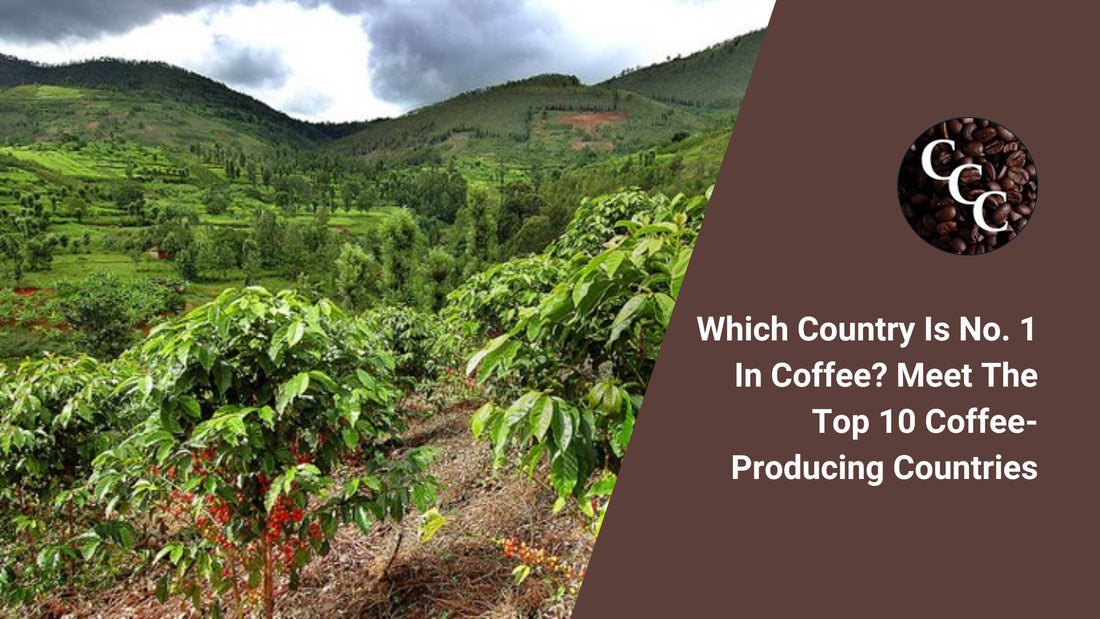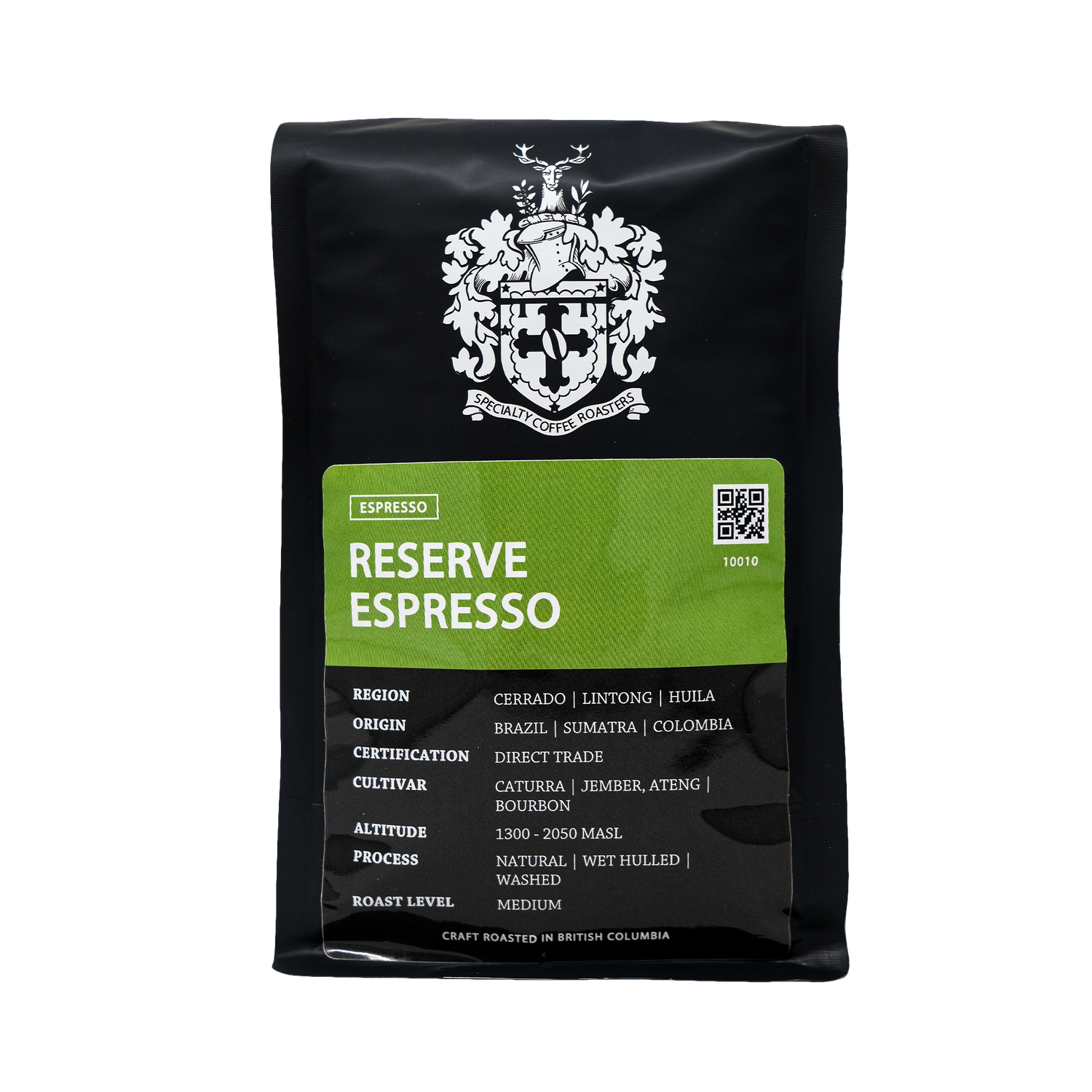Coffee is a beloved beverage worldwide, and its journey from bean to cup involves intricate processes rooted in diverse cultures and landscapes. But which country holds the crown in coffee production? Here, we dive into the top 10 coffee-producing countries, revealing the leaders in this industry and what makes their coffee unique.

Which Country is No. 1 in Coffee? Meet the Top 10 Coffee Producing Countries
Share
Which Country is No. 1 in Coffee? Meet the Top 10 Coffee Producing Countries
1. Brazil: The Coffee Giant
Why Brazil is No. 1 in Coffee Production

Brazil stands as the undisputed leader in coffee production, responsible for approximately one-third of the world’s coffee.
The country’s vast landscape and favourable climate conditions make it ideal for coffee cultivation.
The states of Minas Gerais, São Paulo, and Paraná are particularly renowned for their coffee plantations.
Brazilian Types of Coffee And Noteworthy Facts
- Arabica and Robusta beans are produced in Brazil, with Arabica being more dominant.
- The coffee is known for its smooth, mild flavour with chocolate and nutty undertones.
- Brazil’s coffee culture dates back to the early 18th century.
- With the largest coffee plantations globally, some farms spanning thousands of acres.
2. Vietnam: The Robusta Leader
Vietnam’s Rise in Coffee Production

Vietnam is recognized as the second-largest coffee producer in the world, primarily known for its robust and flavorful Robusta beans. This significant position in the global coffee market is a testament to the country's impressive agricultural capabilities and dedication to coffee cultivation.
Vietnam's coffee industry experienced a remarkable boom in the late 20th century, driven by substantial investments and innovative farming techniques. This period of rapid growth and development transformed Vietnam into a true coffee powerhouse, solidifying its reputation as a leading coffee producer on the international stage.
Vietnamise Types of Coffee And Noteworthy Facts
- Robusta beans dominate Vietnam's coffee output, contributing to its strong, bold flavour profile.
- Vietnamese coffee is often enjoyed with sweetened condensed milk, creating the famous "cà phê sữa đá."
- Vietnam accounts for nearly 40% of the world’s Robusta production.
- The country’s coffee culture is vibrant, with unique brewing methods like the phin filter.
3. Colombia: The Land of Arabica

Colombia is renowned worldwide for its high-quality Arabica coffee, often considered the gold standard in the industry. The country's diverse climate and varied high-altitude regions create the perfect conditions for cultivating coffee beans with distinct, rich flavors.
These unique environmental factors contribute to the exceptional quality and aromatic complexity that Colombian coffee is famous for, making it a favorite among coffee enthusiasts globally.
Colombian Types of Coffee And Noteworthy Facts
- Colombian coffee is almost exclusively Arabica, known for its well-balanced acidity and rich caramel sweetness.
- The regions of Huila, Antioquia, and Nariño are particularly famous.
- Colombia's National Federation of Coffee Growers, established in 1927, plays a crucial role in maintaining the coffee quality.
4. Indonesia: The Archipelago of Coffee

Indonesia ranks fourth in global coffee production, boasting a diverse range of coffee beans thanks to its unique archipelagic geography. The country's numerous islands, each with distinct microclimates, contribute to this diversity. Furthermore, Indonesia's volcanic soil, rich in minerals, significantly enhances the flavor profile of its coffee, giving it a robust and unique taste that is highly prized by coffee aficionados worldwide.
This combination of geographical and environmental factors makes Indonesian coffee truly special and distinctive in the global market.
Indonesian Types of Coffee And Noteworthy Facts
- Indonesia produces both Arabica and Robusta beans, with notable varieties like Sumatra, Java, and Sulawesi.
- These beans are known for their earthy, full-bodied profiles with spicy notes.
- Indonesia’s wet-hulled processing method gives its coffee a unique flavour.
- The country’s coffee culture is diverse, with each region boasting distinct brewing techniques.
5. Ethiopia: The Birthplace of Coffee

Ethiopia is celebrated as the birthplace of coffee, a distinction that comes with a rich heritage dating back centuries. This ancient connection to coffee is deeply woven into the fabric of Ethiopian culture and social life. Coffee ceremonies are an integral part of daily life, symbolizing hospitality, respect, and community.
The profound historical and cultural significance of coffee in Ethiopia has been passed down through generations, making it much more than just a beverage; it is a vital part of the nation's identity and social traditions.
Ethiopian Types of Coffee And Noteworthy Facts
- Ethiopian coffee is predominantly Arabica, with famous varieties like Sidamo, Yirgacheffe, and Harrar.
- Beans are known for their fruity, floral notes and vibrant acidity.
- Ethiopia’s coffee ceremonies are a significant cultural tradition.
- The country’s genetic coffee diversity is unparalleled, with numerous unique bean varieties.
6. Honduras: The Rising Star

Honduras has rapidly emerged as a major coffee producer on the global stage, gaining a strong reputation for its high-quality Arabica beans. This success can be attributed to the country's favorable climate, which provides ideal conditions for coffee cultivation. Additionally, the dedication and expertise of Honduran farmers play a crucial role in this achievement.
Their commitment to sustainable practices and continuous improvement in coffee-growing techniques has significantly contributed to the consistent production of exceptional coffee beans.
Honduran Types of Coffee And Noteworthy Facts
- Honduran coffee is primarily Arabica, offering a balanced flavour with notes of chocolate, nuts, and tropical fruits.
- Regions like Copán and Santa Bárbara are well-known for their exceptional beans.
- Honduras has invested heavily in improving coffee quality and sustainability.
- The country’s coffee industry supports a significant portion of its rural economy.
7. India: A Blend of Tradition and Modernity

India has established itself as a significant player in the global coffee market, producing both Arabica and Robusta beans. The country's vast and varied landscapes, encompassing a wide range of climates and altitudes, create ideal conditions for coffee cultivation. These diverse environmental factors result in unique and distinctive coffee profiles that set Indian coffee apart from others. The combination of rich, fertile soils and innovative farming techniques contributes to the production of high-quality beans with flavors that reflect the complexity of the Indian terrain, making Indian coffee highly sought after by coffee connoisseurs.
indian Types of Coffee And Noteworthy Facts
- Indian coffee is known for its bold, spicy flavours, often with hints of pepper and cardamom.
- The regions of Karnataka, Kerala, and Tamil Nadu are key coffee-growing areas.
- India’s monsooned Malabar coffee undergoes a unique aging process, giving it a distinctive flavor.
- The country’s coffee production is deeply intertwined with its colonial history.
8. Uganda: The Pearl of Africa’s Coffee

Uganda stands as Africa’s second-largest coffee producer, gaining recognition for its robust and flavorful Robusta beans. The country's coffee industry plays a crucial and integral role in its economy, providing livelihoods for millions of Ugandans and contributing significantly to its export revenues.The rich agricultural landscape and favorable growing conditions foster the production of high-quality coffee, which has become a key component of the nation's economic framework. The dedication and hard work of Ugandan farmers ensure the continued success of the country's coffee industry on the global stage.
Ugandan Types of Coffee And Noteworthy Facts
- Uganda produces both Arabica and Robusta beans, with Robusta being more prevalent.
- The coffee has a robust, full-bodied flavour with notes of chocolate and fruit.
- Uganda’s coffee industry employs millions of people.
- The country is making strides in improving coffee quality and sustainability.
9. Mexico: The Organic Coffee Leader

Mexico is widely recognized for its high-quality Arabica coffee, which is frequently grown using organic methods. The country's diverse range of climates, from mountainous regions to tropical areas, provides ideal conditions for cultivating exceptional coffee beans. This environmental diversity, coupled with a strong commitment to sustainable farming practices, has propelled Mexico into the ranks of the world's top coffee producers. Mexican coffee farmers' dedication to organic and eco-friendly cultivation techniques not only enhances the flavor and quality of the coffee but also supports environmental conservation and sustainable development, solidifying Mexico's reputation in the global coffee market.
Mexican Types of Coffee And Noteworthy Facts
- Mexican coffee is predominantly Arabica, characterized by its mild flavour with hints of chocolate and nuts.
- Regions like Chiapas and Oaxaca are particularly renowned.
- Mexico is a leader in organic coffee production.
- The country’s coffee industry supports numerous smallholder farmers.
10. Peru: The Sustainable Coffee Champion

Peru has emerged as a prominent and influential player in the global coffee industry, gaining recognition for its production of high-quality Arabica beans. The country's coffee-growing regions, characterized by their diverse microclimates and rich, fertile soils, create the perfect environment for cultivating beans with exceptional flavor profiles. Moreover, Peru's strong commitment to sustainable farming practices has further enhanced its reputation. Peruvian coffee farmers prioritize organic methods and eco-friendly techniques, ensuring the long-term health of the environment while producing top-tier coffee. This dedication to sustainability and quality has firmly established Peru as a key and respected player in the international coffee market.
Peruvian Types of Coffee And Noteworthy Facts
- Peruvian coffee is mostly Arabica, offering a bright acidity with floral and fruity notes.
- Regions like Cajamarca and Cusco are famous for their specialty beans.
- Peru’s coffee industry emphasizes organic and fair-trade practices.
- The country’s diverse microclimates contribute to its unique coffee profiles.
Top Coffee Producing Countries FAQs
Which country is the largest producer of coffee in the world?
Brazil is the largest producer of coffee globally, contributing approximately one-third of the world's coffee supply. The country's vast coffee plantations, favourable climate, and centuries-old coffee-growing tradition make it the top coffee producer.
What makes Colombian coffee unique?
Colombian coffee is renowned for its high-quality Arabica beans, which are grown in diverse climates and high-altitude regions. These conditions produce beans with distinct, rich flavours characterized by well-balanced acidity and caramel sweetness, making Colombian coffee highly sought after.
How has Vietnam become a leading coffee producer?
Vietnam has become the second-largest coffee producer in the world, primarily due to its focus on Robusta beans. The country's favourable growing conditions and significant investment in coffee production since the late 20th century have led to its prominent position in the global coffee market.
What is special about Ethiopian coffee?
Ethiopia is celebrated as the birthplace of coffee and is known for its rich coffee heritage. Ethiopian coffee, predominantly Arabica, is famous for its diverse flavour profiles, which include fruity and floral notes with vibrant acidity. The country's unique coffee ceremonies and cultural significance further enhance its global reputation.
Why is Indonesian coffee distinctive?
Indonesian coffee is distinctive due to the country's archipelagic geography and volcanic soil, which create unique growing conditions. This results in a diverse range of coffee beans with robust, earthy flavours and spicy notes. The wet-hulled processing method used in Indonesia also contributes to the coffee's unique taste.
How does Peru's commitment to sustainability impact its coffee production?
Peru's commitment to sustainable farming practices has significantly impacted its coffee production. By prioritizing organic methods and eco-friendly techniques, Peruvian coffee farmers produce high-quality Arabica beans with exceptional flavour profiles. This dedication to sustainability not only enhances the coffee's quality but also supports environmental conservation and the long-term viability of the coffee industry in Peru.

